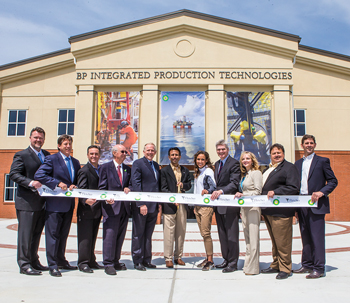 |
| The Integrated Production Technology (IPT) school on the campus of Fletcher Technical Community College officially hosted a grand opening ribbon cutting in late March. Guest of Honor, Louisiana Governor Bobby Jindal (middle), presided. |
|
The oil and gas industry, especially offshore, will increasingly experience a serious gap of skilled technicians, as large numbers of older and more experienced employees reach retirement age. Educating and training a new generation is the key to keeping the talent gap from widening.
Aspiring offshore production operators and technicians will begin instruction this summer at the newly constructed Integrated Production Technology (IPT) school on the Fletcher Technical Community College campus at Schriever, La.
Fletcher officials said there will be no shortage of students eager to help put a dent in what is generally characterized as a serious shortage of deepwater production operators. Since the IPT program was initiated in 2010, classes have been held in the cramped quarters of the main Fletcher campus. Fletcher officials expect the inaugural class in the new facility to include 170–180 students, up considerably from the 97-student enrollment at the beginning of 2013. “Enrollment has actually grown by 200% since the program began,” said Jessica Thornton, director of philanthropy and stewardship for the Fletcher Foundation. “We also have seen a 98% employment rate among our graduates.”
Owing to the increasing demand for offshore production personnel, BP and the State of Louisiana agreed to split the $8 million needed to build the IPT-dedicated 29,000-sq-ft complex located on a 38.6-acre site on the Fletcher campus. The new building houses 10 classrooms and 3,200 sq ft of fully equipped laboratories and equipment for hands-on training.
When students successfully complete the 66 credit hours required for the two-year curriculum, they will hold an Associate of Applied Science degree in IPT, making them fully qualified as production operators and technicians. The school says its mission is to provide students a “solid foundation” that clears the way for their assimilation into an individual operator’s specific company culture.
“Obviously, IPT is one of the fastest growing curriculums we offer, and we look for that to continue for several years, because of all the work being done with the new offshore (production) facilities,” said Mickey Diez, dean of student services. “We’re getting inquiries from all age groups, from those right out of high school to those who are much older and seeking to make career changes. The expectations for the deepwater activity have generated so much interest that we’re getting inquiries from California to Florida.”
Designed to integrate students into the daily working life on a deepwater production facility, the Fletcher officials say much of the IPT academic and technical curriculum takes a hands-on approach that includes real-life scenarios. Along with English composition, algebra and other academic courses, students also must complete a wide range of technical disciplines, ranging from the basics of deepwater systems and technology to fluid mechanics and applied electricity and electronics. Members of the U.S. Coast Guard serve on the IPT advisory council and frequently lecture students on ever-changing federal regulations.
FLUIDS SIMULATION
Unique to the IPT school is extensive studies in fluids simulation under the direction of Steven Lee, who heads up the newly created position of director of R&D. Thornton said the initiative has generated tremendous industry interest. “This is something our external stakeholders are really interested in, because what we’ve be hearing is that no one is really doing this, not even in the industry,” she said.
Lee said BP also is the primary funding source for the distinctive fluids simulation program, providing the large, specially designed workstations and 3D modeling software required. “Our main focus is fluid simulation, which is a very new enterprise for this campus and quite a rare commodity for any school,” he said. “As far as we can tell, what we are doing here is something that normally belongs in large universities.”
Lee said that while the studies undertaken are being embedded in fluid mechanics and other IPT courses, the fluids simulation R&D program is providing benefits outside the campus. “The benefits extend beyond the Fletcher family and into the industry. Part of our initiative here at Fletcher, of course, is to embrace partnerships with industry and the private sector,” he said. 
|



